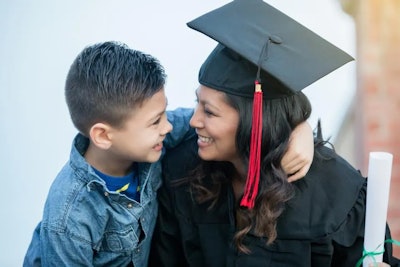Community college students who are raising children demonstrate higher levels of academic engagement than their peers but face significant obstacles that threaten their educational success, according to a new national report.

"Parenting students are among the most engaged learners on our campuses, but they face barriers that too often derail their progress," said Dr. Linda García, CCCSE's executive director.
The report, titled "Multiple Responsibilities, Single Mission: Understanding the Experiences of Community College Parenting Students," analyzed data from 164 colleges during the 2024 administration of the Community College Survey of Student Engagement. About half of all undergraduate student parents attend community colleges, making this population crucial to institutional success.
Key findings reveal troubling gaps between student needs and institutional support. While 71 percent of parenting students reported that caring for dependents could cause them to withdraw from college, 91 percent said they never used child-care services. Similarly, though nearly three-quarters cited lack of finances as a potential withdrawal factor, over one-third never used financial aid advising.
The data shows parenting students face greater food and housing insecurity than their peers. Among those who needed assistance with food, only 16 percent of parenting students received help from their colleges, compared to 8 percent of non-parenting students who needed similar support.
Despite these challenges, parenting students scored higher across all five CCSSE benchmarks measuring student engagement, including academic challenge, student effort, and student-faculty interaction. They were more likely to work harder than expected to meet instructor standards and to prepare multiple drafts of assignments.
"These students have chosen to attend college despite the difficulties they face," the report states, noting that their success has intergenerational effects on their children's educational outcomes.
The demographic profile of parenting students reflects their unique challenges. Compared to their peers, they are more likely to be female (78 percent versus 57 percent), older, first-generation college students, and Pell Grant-eligible. Nearly half are married, and 43 percent work more than 30 hours per week.
Career advancement drives many parenting students' educational goals. While 56 percent cited changing careers as a motivation—compared to 33 percent of non-parenting students—60 percent never accessed career counseling services.
The report highlights innovative support programs at institutions nationwide, including partnerships with local child-care providers, targeted financial assistance, and comprehensive wraparound services that address both academic and family needs.
At Howard Community College in Maryland, President Dr. Daria J. Willis, who authored the report's foreword, described her own experience as a student parent in 2004 when "isolation remained the defining feature" of her undergraduate experience. The college has since reopened its Children's Learning Center with federal grant support, serving more than 30 children while their parents pursue education.
Other featured programs include Lee College in Texas, which provides weekly child-care assistance and family-friendly campus events, and Madison College in Wisconsin, which has integrated student parent data into its information systems and is building a $10 million Early Learning Campus.
The report found that one-third of parenting students disagreed when asked if their college supports them as a parent or caregiver, indicating significant room for improvement in institutional responses.
CCCSE recommends that colleges conduct comprehensive audits of policies that may create barriers for parenting students, develop strategic plans with measurable goals for this population, and establish partnerships with local child-care providers.
















